江苏省徐州市铜山区太山中学牛津译林版九年级上册英语:9AUnit 3 Teenage problems Revision课件(共61张PPT)
文档属性
| 名称 | 江苏省徐州市铜山区太山中学牛津译林版九年级上册英语:9AUnit 3 Teenage problems Revision课件(共61张PPT) | 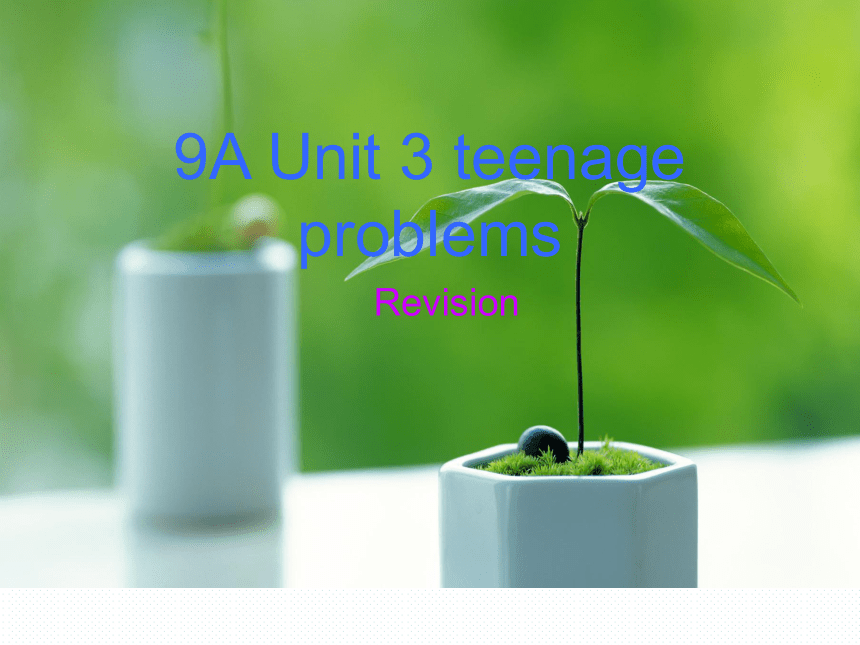 | |
| 格式 | zip | ||
| 文件大小 | 1.1MB | ||
| 资源类型 | 教案 | ||
| 版本资源 | 牛津译林版 | ||
| 科目 | 英语 | ||
| 更新时间 | 2016-02-18 23:30:17 | ||
图片预览

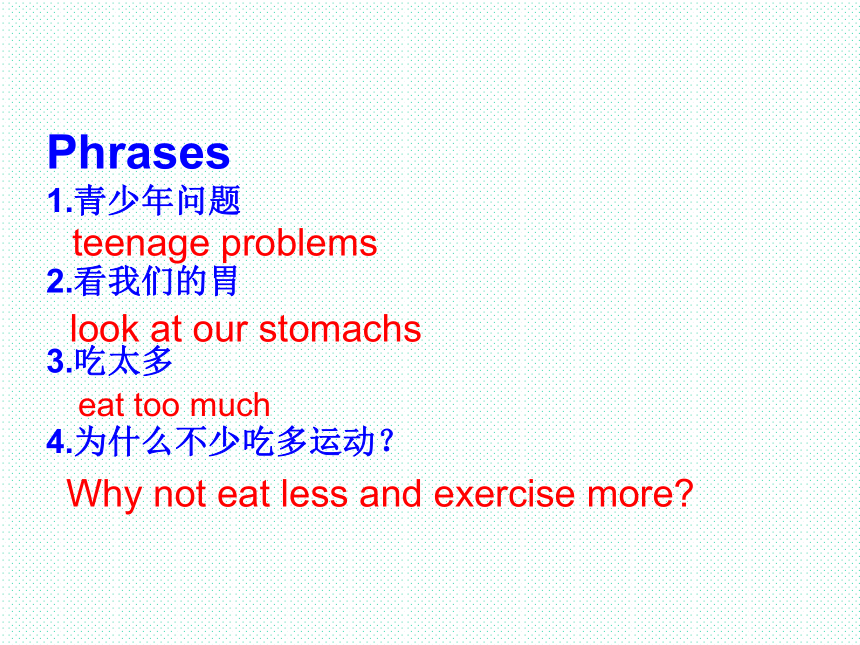
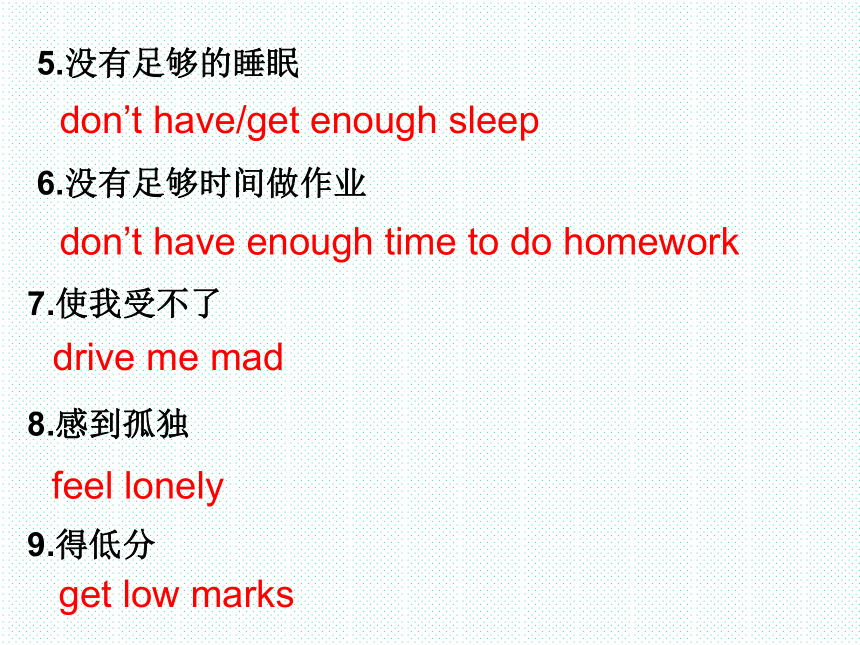
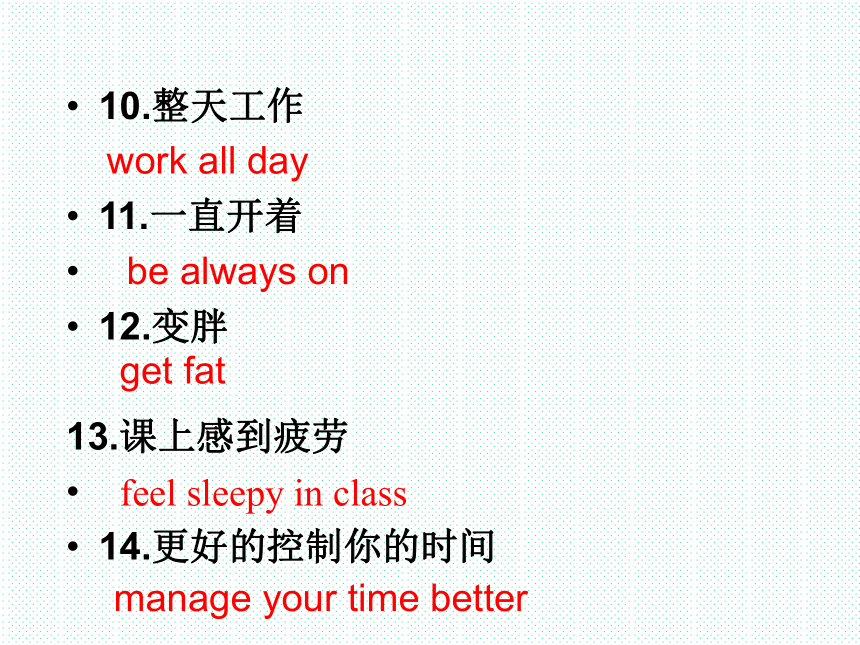

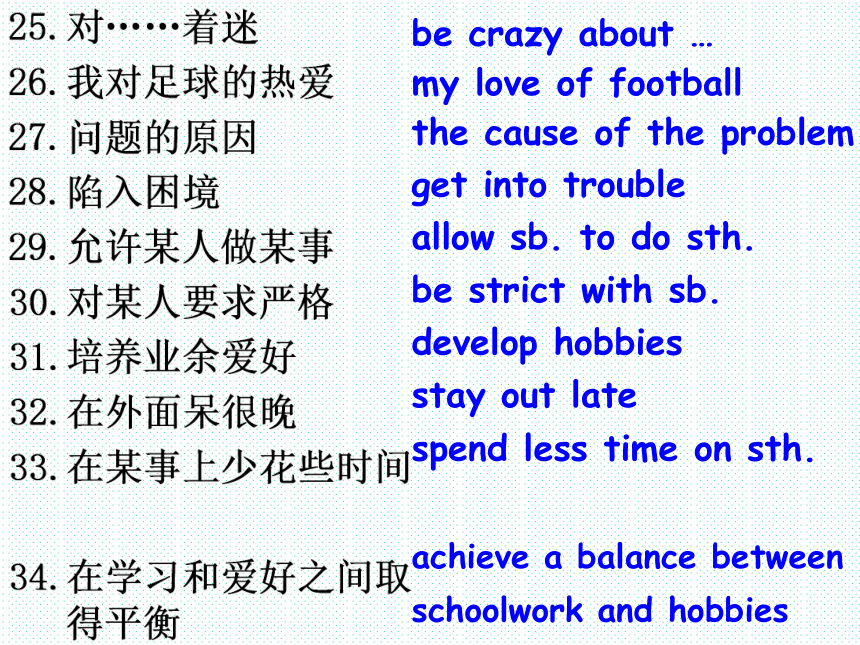
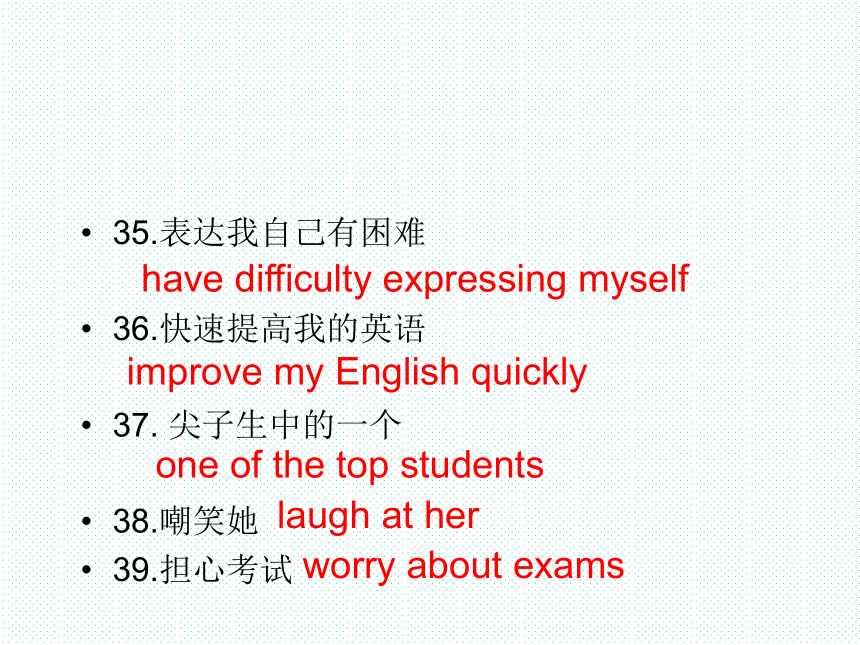
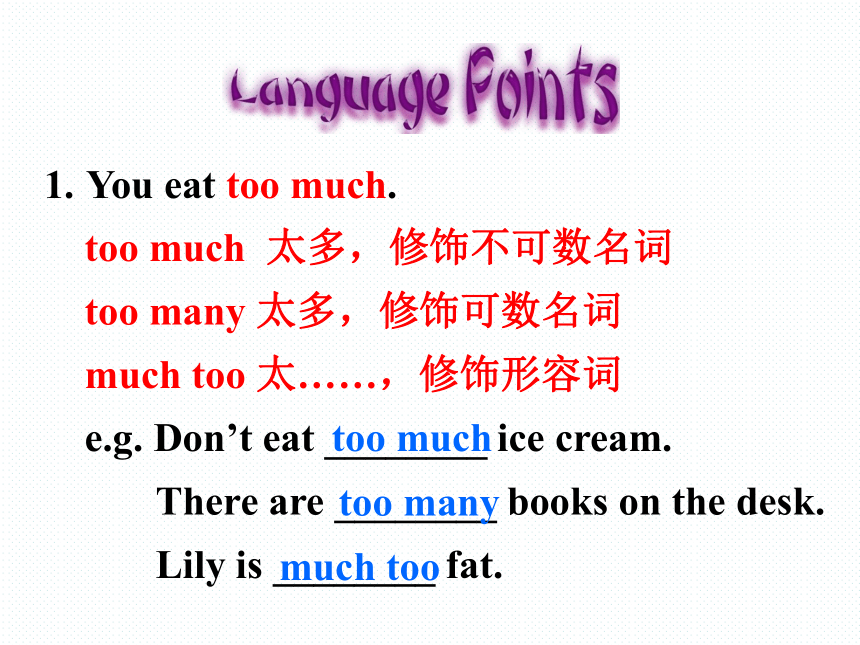
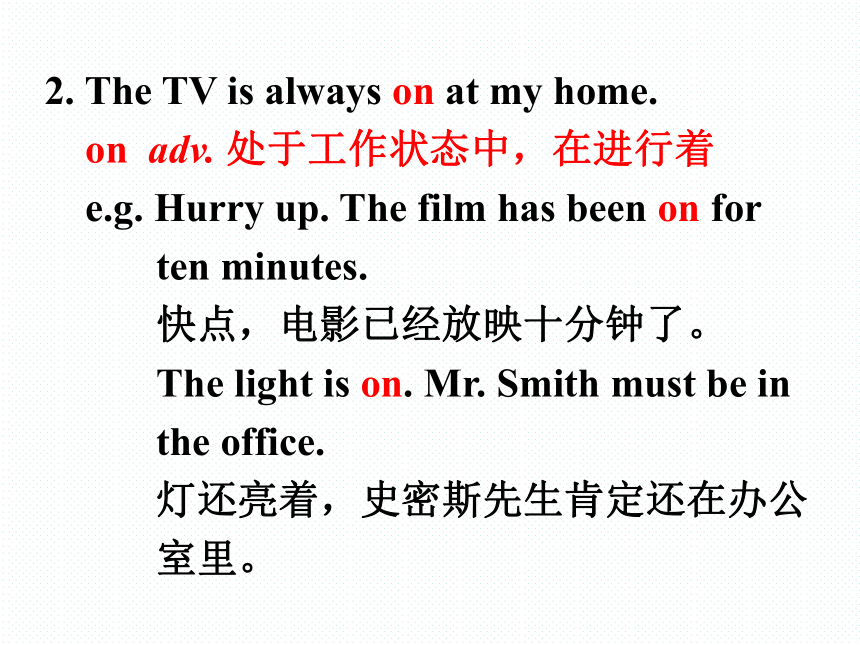
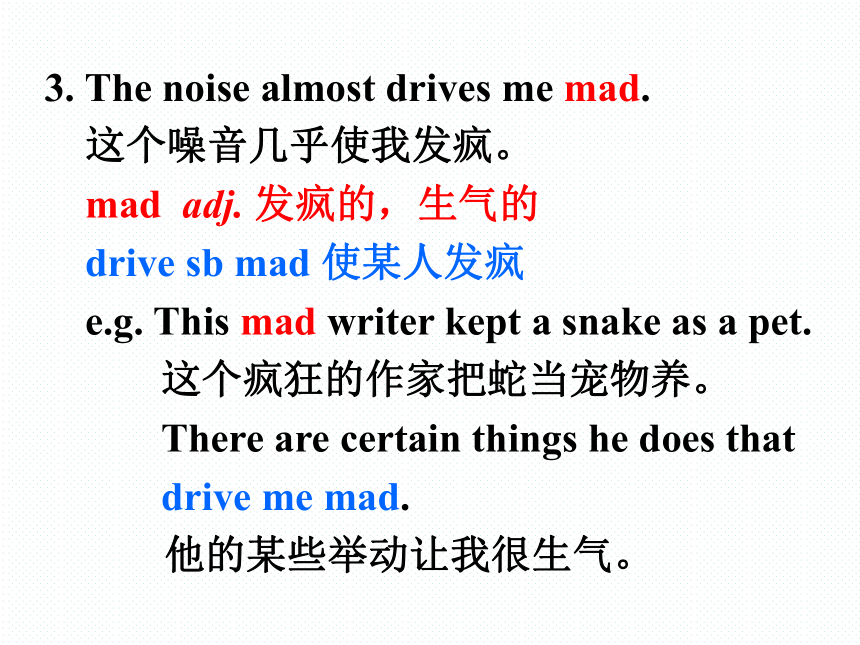
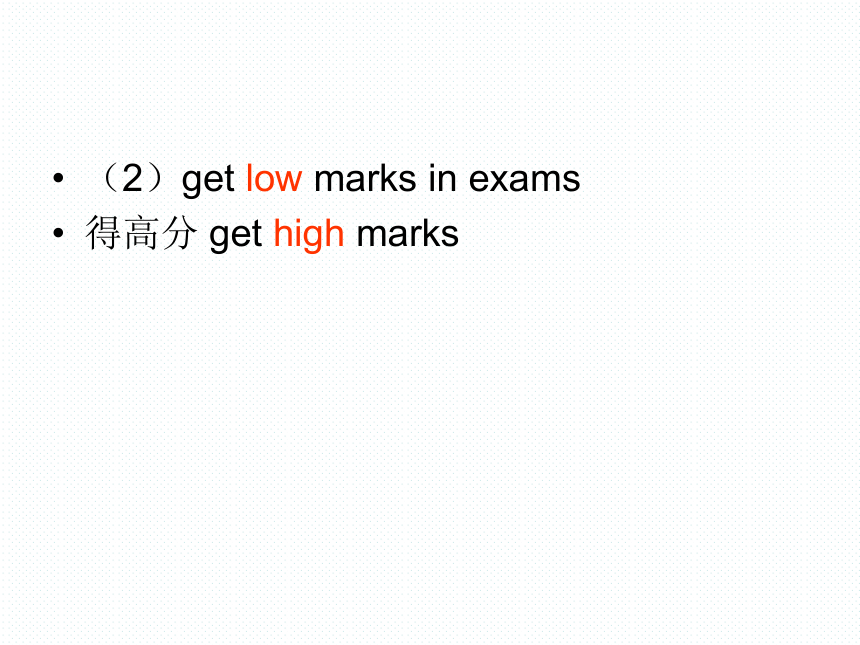
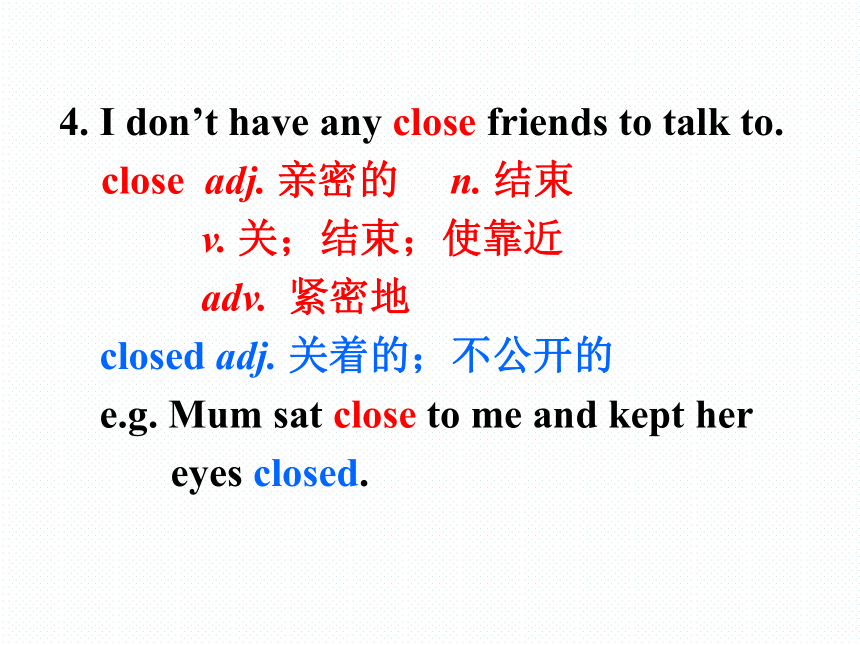
文档简介
课件61张PPT。9A Unit 3 teenage problemsRevisionPhrases
1.青少年问题 2.看我们的胃 3.吃太多 4.为什么不少吃多运动? teenage problems look at our stomachs eat too much Why not eat less and exercise more? 5.没有足够的睡眠
6.没有足够时间做作业
7.使我受不了
8.感到孤独
9.得低分
don’t have/get enough sleep get low marks feel lonelydrive me maddon’t have enough time to do homework10.整天工作
11.一直开着
12.变胖
13.课上感到疲劳
14.更好的控制你的时间 feel sleepy in class get fat be always on work all daymanage your time better15. 处理
16.别无选择,只能……
17. 熬夜到很晚
18. 保持清醒
19. 准时
20. 有时间顾及爱好
21. ……值得一做
22. 花如此多的时间在
家作上
23. 梦想
24.给我提供一些建议deal/do with
have no choice but to do …
stay up late
stay awake
on time
have time for hobbies
… be worth doing
spend so much time on homework
dream of
offer me some suggestions25.对……着迷
26.我对足球的热爱
27.问题的原因
28.陷入困境
29.允许某人做某事
30.对某人要求严格
31.培养业余爱好
32.在外面呆很晚
33.在某事上少花些时间
34.在学习和爱好之间取得平衡be crazy about …
my love of football
the cause of the problem
get into trouble
allow sb. to do sth.
be strict with sb.
develop hobbies
stay out late
spend less time on sth.
achieve a balance between schoolwork and hobbies35.表达我自己有困难
36.快速提高我的英语
37. 尖子生中的一个
38.嘲笑她
39.担心考试 have difficulty expressing myself improve my English quickly one of the top students laugh at herworry about examsYou eat too much.
too much 太多,修饰不可数名词
too many 太多,修饰可数名词
much too 太……,修饰形容词
e.g. Don’t eat ________ ice cream.
There are ________ books on the desk.
Lily is ________ fat.too muchtoo manymuch too 2. The TV is always on at my home.
on adv. 处于工作状态中,在进行着
e.g. Hurry up. The film has been on for
ten minutes.
快点,电影已经放映十分钟了。
The light is on. Mr. Smith must be in
the office.
灯还亮着,史密斯先生肯定还在办公
室里。3. The noise almost drives me mad.
这个噪音几乎使我发疯。
mad adj. 发疯的,生气的
drive sb mad 使某人发疯
e.g. This mad writer kept a snake as a pet.
这个疯狂的作家把蛇当宠物养。
There are certain things he does that
drive me mad.
他的某些举动让我很生气。 (2)get low marks in exams
得高分 get high marks4. I don’t have any close friends to talk to. close adj. 亲密的 n. 结束
v. 关;结束;使靠近
adv. 紧密地
closed adj. 关着的;不公开的
e.g. Mum sat close to me and kept her
eyes closed.5. I have a lot homework to do everyday, and I have no choice but to do it.
每天我都有很多作业,我别无选择,只能去做。
choice n. 选择
句中的choice表示“选择权,选择的可能性”,have no choice but to …意思是“别无选择只能……”e.g. The little girl had no choice but to ask for mother’s help.
这个小女孩没有其他办法,只能去找妈妈帮忙。6. I often have to stay up late.
我经常不得不熬夜到很迟。
stay up 熬夜
stay up late 熬夜到很迟
e.g. I stayed up last night, so I am very
tired now.
我昨天晚上熬夜了,所以现在很
累。
stay away from??不要靠近;避开
stay out 待在户外;(晚上)不回家7. Then I sometimes find it hard to stay
awake the next day. 然后我有时发现
第二天保持清醒很困难。
awake adj. 醒着的
通常用在系动词be的后面作表语。
e.g. My grandfather was awake all
night.
我祖父整晚都醒着。作定语时通常放在被修饰词之后。
e.g. Mary is the only person awake now.
玛丽是现在唯一醒着的人。将下列句子翻译成英语。
1)你为什么还醒着?已经夜里11点钟了!
_________________________________
_________________________________
2)昨天晚上,某个醒着的人打开了电视。
_________________________________
_________________________________Why are you still awake?
It’s already eleven o’clock at night!Someone awake turned on the TV
last night.wake与awake只有一个字母之差,wake是动词,意为“叫醒”,通常与up连用。
e.g. It’s time for lunch. Go and wake up
your father.
午餐时间到了。去叫醒你爸爸。
Mum, please wake me up before six
o’clock tomorrow morning.
妈妈,明天早上六点前叫醒我。wake和awakeawake可以用作及物动词,意为“唤醒,弄醒,叫醒”,也可以用作不及物动词,意为“醒来”。
e.g. The songs of birds awoke me.??
小鸟的歌声叫我唤醒了。
I awoke early this morning.
我今天早上醒的很早。 8. I cannot imagine my life without hobbies.
imagine vt. vi. 想象;设想
imagine sth. 表示“想象某事”。
e.g. We can hardly imagine life without
electricity.
我们不能想象没有电的生活。
imagine doing sth. 表示“想象做某事”。
e.g. Try to imagine being on the moon.
试着想象月球上生活。imagine +从句?
e.g. Don’t imagine that I can lend you money every time you need it.?
不要想每回你需要钱的时候和我借。9. I often doubt whether it is worth spending so much time on my homework.
我常常怀疑花这么多时间做家庭作业是否值得。
doubt vt. 怀疑
在肯定句中一般接if/whether引导的从句;在否定句中接that引导的从句。e.g. We doubt if/whether David told us
the truth. 我们怀疑戴维是否告诉
了我们事情的真相。
We never doubt that David is honest.
我们从不怀疑戴维的诚实。
短语be worth (doing) something 意思是“值得……”后面接动词-ing形式或名词。
e.g. The Summer Palace is worth a visit.
颐和园值得一游。10. I dream of a long holiday so that I could have more time for my hobbies.
我梦想有个长假好让我有更多的时间从事我的爱好。
短语dream of/about (doing) something意思是“梦想,想象”。
e.g. She dreamt of entering one of the
top universities in the world.
她梦想进入一所世界一流大学。11. Can you offer me some suggestions?
你能给我些建议吗?
suggestion n. 建议 用作可数名词
advice也意为“建议”,常用作不可数名
词,“一条建议”需用 a piece of advice
来表达。12. I do not understand why they are so
strict with me.
我不理解他们为什么对我如此严厉。
strict adj. 严格的,严厉的
在句中既可以作表语,也可以作定语
e.g. Mr Smith is always very strict.
史密斯总是很严厉。
Miss Zhang is a very strict teacher.
张小姐是一位严厉的老师。be strict with sb. 对某人严厉
e.g. She is strict with her children.
她对他的孩子严格.
be strict in sth.对某事严格
e.g. He is strict in everything.
他事事严格要求. 13. I’m very worried. 我非常担心。
worried adj. 担心的, 烦恼的
可用于系表结构, 主语一般是人。
be worried about sth. /sb
worrying adj. 令人担忧的, 令人担心的
主语一般为事物。
worry v. 担心
worry (about) sth./ sb. 14. Perhaps you should go over what you’ve learnt as often as possible.
也许你应该尽可能多地复习你已经学习过的知识。
go over 复习; 回顾
e.g. Go?over?the text before the exam.
考试前复习课文。Perhaps you should go over what you’ve learnt as often as possible.go over 复习;回顾
句型as … as possible意思是“尽可能......的”。宾语从句请尽快回答我的问题。
Please answer my question as soon as possible.
I always go over my revision notes just before I go into an exam.
我在参加考试前总是会把复习笔记重温一遍。15. Don’t mention it.
不客气。
mention vt. 提及; 说起
同样的说法还有:
With pleasure.
You’re welcome.
That’s all right.16.Many students of our age have this problem.介词短语of ... age,意思是“和......同龄的”。Language point后置定语她需要更多和她同龄的朋友。
She needs more friends of her own age.学好宾语从句共有三关:
连接词——语序——时态
Are you ready?连接代词和连接副词
引导的宾语从句特殊疑问句做宾语Which coat did you like best?I wonder which coat you like best.用疑问引导,改为陈述语气。我想知道你最喜欢哪一条领带?Which tie do you like best?特殊疑问句变成 陈述语序
连接词就是疑问词本身I wonderI wonder ATTENTIONwhich tie you like best我们可用连接代词和连接副词引导宾语从句,此时从句部分的语义相当于一个特殊疑问句。
I?want?to?know?whom/who?you?are?waiting for.
Do you know when we will hold the sports meeting?连接代词:what、who、whom、
whose、which
连接副词:when、where、
how、why连接代词和连接副词有词义,并且在从句中充当句子成分。
Can you tell me what you are doing?
你能告诉我你们在做什么吗?
(what在从句中作宾语,意思是“什么”)宾语从句的语序必须是陈述语序。When did he leave? I don’t know.
→ I don’t know when he left.
He is wondering when he can finish this difficult job. 宾语从句中的连接代词who与whom都指人,意思是“谁”。其中who为主格,在从句中作主语;whom为宾格,在从句中作宾语。
I don’t know who is singing next door.
我不知道谁在隔壁唱歌。
Do you know who/whom he is waiting for?
你知道他在等谁么? whom在口语中很少使用。大多数情况下,我们可以用who代替whom。含有宾语从句的复合句的标点由主句决定。
I don’t know if/whether he will come tomorrow.
我不知道他明天是否会来。
Do you know which film they are talking about?
你知道他们谈论的是哪部电影么? RulesObject clauses introduced by question words
Wh-引导词 +主+谓+其他eg
I wonder what I should do.
Daniel does not know whom he should talk to. Rules(1)遵守主句和从句的时态呼应
(2)从句中要用陈述语序而不用疑问语序
即 引导词+ 主语+谓语+ 其他How old is Tom? I want to know. I want to know how old Tom is.Rules(3)含有助动词do, does, did的疑问句变为宾语从句时要将帮助构成疑问句的助动词do does, did 去掉,从句中的谓语动词要根据主句的时态做出相应的变化When did the train leave? I want to know. I want to know when the train left.What time did she get up? The young
man asked.The young man asked what time
she got up.Rules(4)如果宾语从句中的引导词恰好在从句中充当主语或主语的定语,则句子保持原有结构What’s the matter with her? Can you tell me?--Can you tell me what’s the matter
with her?What has happened to him? We don’t know.--We don’t know what has
happened to him.宾语从句三要素that(陈述句 )if/whether(一般疑问句 ) 特殊疑问词(特殊疑问句)主句为一般现在时从句可为任何时态语序宾语从句的语序都为陈述句语序客观真理 自然现象
公式定理 名言警句 时态不变本课小结We give suggestions politely using structures such as Why not…, Why don’t you,…, What/ How about…, Let’s… and Shall we…
Tip:
We also use perhaps to give suggestions. Perhaps you should manage your time better.提建议的句型我们可以用
Why not…?
What/How about…?
Let’s…和Shall we…等提建议。
Perhaps 也可用于建议。
e.g. Perhaps you can park over there.1. ________ go walking in the hills?
2. __________ the Monkey King?
3. _____ have a hamburger.
4. ___________ a music CD?
5. ________ take them to the cinema?
6. ___________ the Pizza in your bowl?
7. ___________ this one? Shall weHow aboutLet’sWhat aboutShall weWhat aboutWhat aboutgo
Ready?8. ___________ some sugar?
9. _____ buy a newspaper, Liz.
10. ________ eat less and exercise more?
11. ___________ choosing your hobby
according to the time you have?
12. ________ just play football for an hour
or two, and then go home? What aboutLet’sWhy notWhat aboutWhy notWhy not ______ an English club to practice speaking English?
A. to join B. join
C. joined D. joining
— We don’t have much homework this
weekend. Shall we go out together?
— OK. What about ______ a movie?
A. to see B. seeing
C. see D. sees句型Why not…?是Why don’t you …?的缩略形式,“为什么不……?” “你为什么不……?”,后面跟动词原形。
e.g. Why not donate your pocket money
to charity?
你为什么不把零用钱捐给慈善组织?
=Why don’t you donate your pocket
money to charity?What/How about …? “……怎么样?” “……如何?”,后面跟名词,代词或者动名词。
e.g.
What/ How about having a cup of coffee?
喝杯咖啡怎么样?let’s … “让我们……吧”,后接动词原形。
e.g. Let’s listen to the teacher.
让我们听老师讲吧。
Shall we …? “我们……好吗?”
后面跟动词原形。
e.g. Shall we go swimming tomorrow?
我们明天游泳好吗?Giving suggestionsWe give suggestions politely using structures such as
Why not do… ?
Why don’t you do …?
What/How about doing …?
Let’s do….
Shall we do…?
Perhaps you should do…1. — Do you know ______ the girl in blue
is?
— I’m not sure. Maybe a teacher.
(2013山东青岛)
A. whose B. how C. what D. which
2. I was told to meet Mr. White at the
airport. But I don’t know ______ he
will arrive. (2013 浙江湖州)
A. when B. how
C. where D. whyI. 单项选择。3. Do you know ______ I saw yesterday?
It was my favorite star, Jackie!
(2013江西)
A. whom B. when C. where D. how
4. — Could you tell me ______?
— To get ready for the High School
Entrance Exam. (2013湖北宜昌)
A. what he is busy
B. why he stays up
C. if he is worried
D. where he can pass the exam 5. — Philip has gone to New Zealand.
— Oh, can you tell me ______?
(2013江苏苏州)
A. when did he leave
B. when he is leaving
C. when he left D. when is he leaving
6. People in Yancheng are proud of ______
they have achieved in the past thirty
years. (2013江苏盐城)
A. how B. which
C. what D. when 7. — What about ______ a rest?
— OK! Let’s go for a walk.
(2012黔西南)
A. to have B. had
C. have D. having
8. Let’s ______ for a walk, shall we?
(2012北京)
A. to go B. going
C. go D. gone 9. — I feel really tired.
— ______ (2013广东广州)
A. Lucky you!
B. You’d better work harder.
C. Congratulations!
D. Why not go and have a rest?
10. — It’s a nice day, isn’t it?
— Yes. ______ going hiking and relax
ourselves? (2013四川凉山)
A. Why not B. Why don’t
C. What about 范文展示Sample writingDear Mr Friend,
Thank you for sharing your problems with me.
You stay up late every day. It is a common problem for a Grade 9 student. I think the best way to solve it is to manage your time carefully. Try to finish some homework during lunchtime at school instead of playing basketball, and then you can go to bed earlier at night.Maybe too much noise at home is another reason that makes you stay up late, because you cannot focus on your work. Your grandfather keeps the TV very loud because his hearing is not very good. How about closing your bedroom door when you study inside? Or perhaps you can tell him about your problem. I am sure he loves you so much that he will listen to you.
I hope you think my advice is worth taking.
Best wishes,
Ivan
6.没有足够时间做作业
7.使我受不了
8.感到孤独
9.得低分
don’t have/get enough sleep get low marks feel lonelydrive me maddon’t have enough time to do homework10.整天工作
11.一直开着
12.变胖
13.课上感到疲劳
14.更好的控制你的时间 feel sleepy in class get fat be always on work all daymanage your time better15. 处理
16.别无选择,只能……
17. 熬夜到很晚
18. 保持清醒
19. 准时
20. 有时间顾及爱好
21. ……值得一做
22. 花如此多的时间在
家作上
23. 梦想
24.给我提供一些建议deal/do with
have no choice but to do …
stay up late
stay awake
on time
have time for hobbies
… be worth doing
spend so much time on homework
dream of
offer me some suggestions25.对……着迷
26.我对足球的热爱
27.问题的原因
28.陷入困境
29.允许某人做某事
30.对某人要求严格
31.培养业余爱好
32.在外面呆很晚
33.在某事上少花些时间
34.在学习和爱好之间取得平衡be crazy about …
my love of football
the cause of the problem
get into trouble
allow sb. to do sth.
be strict with sb.
develop hobbies
stay out late
spend less time on sth.
achieve a balance between schoolwork and hobbies35.表达我自己有困难
36.快速提高我的英语
37. 尖子生中的一个
38.嘲笑她
39.担心考试 have difficulty expressing myself improve my English quickly one of the top students laugh at herworry about examsYou eat too much.
too much 太多,修饰不可数名词
too many 太多,修饰可数名词
much too 太……,修饰形容词
e.g. Don’t eat ________ ice cream.
There are ________ books on the desk.
Lily is ________ fat.too muchtoo manymuch too 2. The TV is always on at my home.
on adv. 处于工作状态中,在进行着
e.g. Hurry up. The film has been on for
ten minutes.
快点,电影已经放映十分钟了。
The light is on. Mr. Smith must be in
the office.
灯还亮着,史密斯先生肯定还在办公
室里。3. The noise almost drives me mad.
这个噪音几乎使我发疯。
mad adj. 发疯的,生气的
drive sb mad 使某人发疯
e.g. This mad writer kept a snake as a pet.
这个疯狂的作家把蛇当宠物养。
There are certain things he does that
drive me mad.
他的某些举动让我很生气。 (2)get low marks in exams
得高分 get high marks4. I don’t have any close friends to talk to. close adj. 亲密的 n. 结束
v. 关;结束;使靠近
adv. 紧密地
closed adj. 关着的;不公开的
e.g. Mum sat close to me and kept her
eyes closed.5. I have a lot homework to do everyday, and I have no choice but to do it.
每天我都有很多作业,我别无选择,只能去做。
choice n. 选择
句中的choice表示“选择权,选择的可能性”,have no choice but to …意思是“别无选择只能……”e.g. The little girl had no choice but to ask for mother’s help.
这个小女孩没有其他办法,只能去找妈妈帮忙。6. I often have to stay up late.
我经常不得不熬夜到很迟。
stay up 熬夜
stay up late 熬夜到很迟
e.g. I stayed up last night, so I am very
tired now.
我昨天晚上熬夜了,所以现在很
累。
stay away from??不要靠近;避开
stay out 待在户外;(晚上)不回家7. Then I sometimes find it hard to stay
awake the next day. 然后我有时发现
第二天保持清醒很困难。
awake adj. 醒着的
通常用在系动词be的后面作表语。
e.g. My grandfather was awake all
night.
我祖父整晚都醒着。作定语时通常放在被修饰词之后。
e.g. Mary is the only person awake now.
玛丽是现在唯一醒着的人。将下列句子翻译成英语。
1)你为什么还醒着?已经夜里11点钟了!
_________________________________
_________________________________
2)昨天晚上,某个醒着的人打开了电视。
_________________________________
_________________________________Why are you still awake?
It’s already eleven o’clock at night!Someone awake turned on the TV
last night.wake与awake只有一个字母之差,wake是动词,意为“叫醒”,通常与up连用。
e.g. It’s time for lunch. Go and wake up
your father.
午餐时间到了。去叫醒你爸爸。
Mum, please wake me up before six
o’clock tomorrow morning.
妈妈,明天早上六点前叫醒我。wake和awakeawake可以用作及物动词,意为“唤醒,弄醒,叫醒”,也可以用作不及物动词,意为“醒来”。
e.g. The songs of birds awoke me.??
小鸟的歌声叫我唤醒了。
I awoke early this morning.
我今天早上醒的很早。 8. I cannot imagine my life without hobbies.
imagine vt. vi. 想象;设想
imagine sth. 表示“想象某事”。
e.g. We can hardly imagine life without
electricity.
我们不能想象没有电的生活。
imagine doing sth. 表示“想象做某事”。
e.g. Try to imagine being on the moon.
试着想象月球上生活。imagine +从句?
e.g. Don’t imagine that I can lend you money every time you need it.?
不要想每回你需要钱的时候和我借。9. I often doubt whether it is worth spending so much time on my homework.
我常常怀疑花这么多时间做家庭作业是否值得。
doubt vt. 怀疑
在肯定句中一般接if/whether引导的从句;在否定句中接that引导的从句。e.g. We doubt if/whether David told us
the truth. 我们怀疑戴维是否告诉
了我们事情的真相。
We never doubt that David is honest.
我们从不怀疑戴维的诚实。
短语be worth (doing) something 意思是“值得……”后面接动词-ing形式或名词。
e.g. The Summer Palace is worth a visit.
颐和园值得一游。10. I dream of a long holiday so that I could have more time for my hobbies.
我梦想有个长假好让我有更多的时间从事我的爱好。
短语dream of/about (doing) something意思是“梦想,想象”。
e.g. She dreamt of entering one of the
top universities in the world.
她梦想进入一所世界一流大学。11. Can you offer me some suggestions?
你能给我些建议吗?
suggestion n. 建议 用作可数名词
advice也意为“建议”,常用作不可数名
词,“一条建议”需用 a piece of advice
来表达。12. I do not understand why they are so
strict with me.
我不理解他们为什么对我如此严厉。
strict adj. 严格的,严厉的
在句中既可以作表语,也可以作定语
e.g. Mr Smith is always very strict.
史密斯总是很严厉。
Miss Zhang is a very strict teacher.
张小姐是一位严厉的老师。be strict with sb. 对某人严厉
e.g. She is strict with her children.
她对他的孩子严格.
be strict in sth.对某事严格
e.g. He is strict in everything.
他事事严格要求. 13. I’m very worried. 我非常担心。
worried adj. 担心的, 烦恼的
可用于系表结构, 主语一般是人。
be worried about sth. /sb
worrying adj. 令人担忧的, 令人担心的
主语一般为事物。
worry v. 担心
worry (about) sth./ sb. 14. Perhaps you should go over what you’ve learnt as often as possible.
也许你应该尽可能多地复习你已经学习过的知识。
go over 复习; 回顾
e.g. Go?over?the text before the exam.
考试前复习课文。Perhaps you should go over what you’ve learnt as often as possible.go over 复习;回顾
句型as … as possible意思是“尽可能......的”。宾语从句请尽快回答我的问题。
Please answer my question as soon as possible.
I always go over my revision notes just before I go into an exam.
我在参加考试前总是会把复习笔记重温一遍。15. Don’t mention it.
不客气。
mention vt. 提及; 说起
同样的说法还有:
With pleasure.
You’re welcome.
That’s all right.16.Many students of our age have this problem.介词短语of ... age,意思是“和......同龄的”。Language point后置定语她需要更多和她同龄的朋友。
She needs more friends of her own age.学好宾语从句共有三关:
连接词——语序——时态
Are you ready?连接代词和连接副词
引导的宾语从句特殊疑问句做宾语Which coat did you like best?I wonder which coat you like best.用疑问引导,改为陈述语气。我想知道你最喜欢哪一条领带?Which tie do you like best?特殊疑问句变成 陈述语序
连接词就是疑问词本身I wonderI wonder ATTENTIONwhich tie you like best我们可用连接代词和连接副词引导宾语从句,此时从句部分的语义相当于一个特殊疑问句。
I?want?to?know?whom/who?you?are?waiting for.
Do you know when we will hold the sports meeting?连接代词:what、who、whom、
whose、which
连接副词:when、where、
how、why连接代词和连接副词有词义,并且在从句中充当句子成分。
Can you tell me what you are doing?
你能告诉我你们在做什么吗?
(what在从句中作宾语,意思是“什么”)宾语从句的语序必须是陈述语序。When did he leave? I don’t know.
→ I don’t know when he left.
He is wondering when he can finish this difficult job. 宾语从句中的连接代词who与whom都指人,意思是“谁”。其中who为主格,在从句中作主语;whom为宾格,在从句中作宾语。
I don’t know who is singing next door.
我不知道谁在隔壁唱歌。
Do you know who/whom he is waiting for?
你知道他在等谁么? whom在口语中很少使用。大多数情况下,我们可以用who代替whom。含有宾语从句的复合句的标点由主句决定。
I don’t know if/whether he will come tomorrow.
我不知道他明天是否会来。
Do you know which film they are talking about?
你知道他们谈论的是哪部电影么? RulesObject clauses introduced by question words
Wh-引导词 +主+谓+其他eg
I wonder what I should do.
Daniel does not know whom he should talk to. Rules(1)遵守主句和从句的时态呼应
(2)从句中要用陈述语序而不用疑问语序
即 引导词+ 主语+谓语+ 其他How old is Tom? I want to know. I want to know how old Tom is.Rules(3)含有助动词do, does, did的疑问句变为宾语从句时要将帮助构成疑问句的助动词do does, did 去掉,从句中的谓语动词要根据主句的时态做出相应的变化When did the train leave? I want to know. I want to know when the train left.What time did she get up? The young
man asked.The young man asked what time
she got up.Rules(4)如果宾语从句中的引导词恰好在从句中充当主语或主语的定语,则句子保持原有结构What’s the matter with her? Can you tell me?--Can you tell me what’s the matter
with her?What has happened to him? We don’t know.--We don’t know what has
happened to him.宾语从句三要素that(陈述句 )if/whether(一般疑问句 ) 特殊疑问词(特殊疑问句)主句为一般现在时从句可为任何时态语序宾语从句的语序都为陈述句语序客观真理 自然现象
公式定理 名言警句 时态不变本课小结We give suggestions politely using structures such as Why not…, Why don’t you,…, What/ How about…, Let’s… and Shall we…
Tip:
We also use perhaps to give suggestions. Perhaps you should manage your time better.提建议的句型我们可以用
Why not…?
What/How about…?
Let’s…和Shall we…等提建议。
Perhaps 也可用于建议。
e.g. Perhaps you can park over there.1. ________ go walking in the hills?
2. __________ the Monkey King?
3. _____ have a hamburger.
4. ___________ a music CD?
5. ________ take them to the cinema?
6. ___________ the Pizza in your bowl?
7. ___________ this one? Shall weHow aboutLet’sWhat aboutShall weWhat aboutWhat aboutgo
Ready?8. ___________ some sugar?
9. _____ buy a newspaper, Liz.
10. ________ eat less and exercise more?
11. ___________ choosing your hobby
according to the time you have?
12. ________ just play football for an hour
or two, and then go home? What aboutLet’sWhy notWhat aboutWhy notWhy not ______ an English club to practice speaking English?
A. to join B. join
C. joined D. joining
— We don’t have much homework this
weekend. Shall we go out together?
— OK. What about ______ a movie?
A. to see B. seeing
C. see D. sees句型Why not…?是Why don’t you …?的缩略形式,“为什么不……?” “你为什么不……?”,后面跟动词原形。
e.g. Why not donate your pocket money
to charity?
你为什么不把零用钱捐给慈善组织?
=Why don’t you donate your pocket
money to charity?What/How about …? “……怎么样?” “……如何?”,后面跟名词,代词或者动名词。
e.g.
What/ How about having a cup of coffee?
喝杯咖啡怎么样?let’s … “让我们……吧”,后接动词原形。
e.g. Let’s listen to the teacher.
让我们听老师讲吧。
Shall we …? “我们……好吗?”
后面跟动词原形。
e.g. Shall we go swimming tomorrow?
我们明天游泳好吗?Giving suggestionsWe give suggestions politely using structures such as
Why not do… ?
Why don’t you do …?
What/How about doing …?
Let’s do….
Shall we do…?
Perhaps you should do…1. — Do you know ______ the girl in blue
is?
— I’m not sure. Maybe a teacher.
(2013山东青岛)
A. whose B. how C. what D. which
2. I was told to meet Mr. White at the
airport. But I don’t know ______ he
will arrive. (2013 浙江湖州)
A. when B. how
C. where D. whyI. 单项选择。3. Do you know ______ I saw yesterday?
It was my favorite star, Jackie!
(2013江西)
A. whom B. when C. where D. how
4. — Could you tell me ______?
— To get ready for the High School
Entrance Exam. (2013湖北宜昌)
A. what he is busy
B. why he stays up
C. if he is worried
D. where he can pass the exam 5. — Philip has gone to New Zealand.
— Oh, can you tell me ______?
(2013江苏苏州)
A. when did he leave
B. when he is leaving
C. when he left D. when is he leaving
6. People in Yancheng are proud of ______
they have achieved in the past thirty
years. (2013江苏盐城)
A. how B. which
C. what D. when 7. — What about ______ a rest?
— OK! Let’s go for a walk.
(2012黔西南)
A. to have B. had
C. have D. having
8. Let’s ______ for a walk, shall we?
(2012北京)
A. to go B. going
C. go D. gone 9. — I feel really tired.
— ______ (2013广东广州)
A. Lucky you!
B. You’d better work harder.
C. Congratulations!
D. Why not go and have a rest?
10. — It’s a nice day, isn’t it?
— Yes. ______ going hiking and relax
ourselves? (2013四川凉山)
A. Why not B. Why don’t
C. What about 范文展示Sample writingDear Mr Friend,
Thank you for sharing your problems with me.
You stay up late every day. It is a common problem for a Grade 9 student. I think the best way to solve it is to manage your time carefully. Try to finish some homework during lunchtime at school instead of playing basketball, and then you can go to bed earlier at night.Maybe too much noise at home is another reason that makes you stay up late, because you cannot focus on your work. Your grandfather keeps the TV very loud because his hearing is not very good. How about closing your bedroom door when you study inside? Or perhaps you can tell him about your problem. I am sure he loves you so much that he will listen to you.
I hope you think my advice is worth taking.
Best wishes,
Ivan
